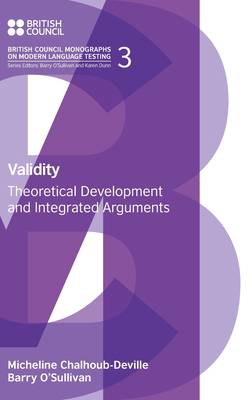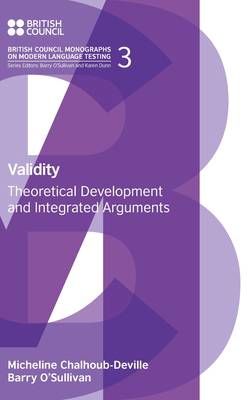
- Retrait gratuit dans votre magasin Club
- 7.000.000 titres dans notre catalogue
- Payer en toute sécurité
- Toujours un magasin près de chez vous
- Retrait gratuit dans votre magasin Club
- 7.000.0000 titres dans notre catalogue
- Payer en toute sécurité
- Toujours un magasin près de chez vous
Validity
Theoretical Development and Integrated Arguments
Micheline Chalhoub-Deville, Barry O'SullivanDescription
Validity: Theoretical Development and Integrated Argumentsprovides a historical overview of validity, targeting developments in both the UK and the US. It explores theoretical notions of validity as well as pragmatic validation practices and expands the arguments that need to be attended to in order to document quality.
The authors examine the need to consider, in addition to the psychometric evidence, which has continued to prevail especially in the US, other critical sources of quality evidence. They call attention to principled design and the evidence accumulated from various departments/groups involved in test design and development. They also promote the concept of impact by design, which places consequences at the top of the evidence chain to guide all testing efforts and quality documentation. They envision validity scholarship to attend to consequences at the individual, aggregate/group, and larger educational/organisational/societal levels. Concomitant with this attention to consequences are considerations of stakeholders and the tailoring of communication to engage intended groups. Such an approach yields a more convincing validity argument. The monograph ends by calling on professionals in the field to publish case studies which showcase localised validity arguments in practice. Local case studies represent critical endeavours to illustrate how evidence and arguments are pulled together to support the quality of a testing programme and all that it entails.
Spécifications
Parties prenantes
- Auteur(s) :
- Editeur:
Contenu
- Nombre de pages :
- 200
- Langue:
- Anglais
- Collection :
Caractéristiques
- EAN:
- 9781781799895
- Date de parution :
- 28-09-20
- Format:
- Livre relié
- Format numérique:
- Genaaid
- Dimensions :
- 156 mm x 234 mm
- Poids :
- 485 g

Les avis
Nous publions uniquement les avis qui respectent les conditions requises. Consultez nos conditions pour les avis.






